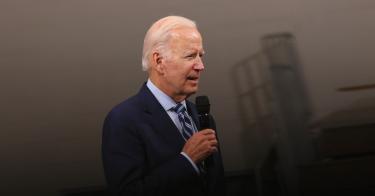The Biden administration’s decision to transfer the debt of college graduates onto working Americans—euphemistically called loan "forgiveness"—brings with it a host of policy and legal questions.
The move has a staggering price tag: at least $570 billion. And that’s not including the continued "pause" on repayments in place through the end of the year, costing taxpayers $5 billion each month. The cost is exceeded only by the unfairness of the action, which punishes the millions of Americans who dutifully paid off their student loans or avoided taking on college debt altogether.
Then there are the inflationary effects, both on the overall economy and on college tuition in the future. Federal subsidies have increased 295% since the 1991-92 academic year, and colleges doubled tuition in real terms in response over the same time period. This massive bailout will drive college costs still higher if university administrators believe students can take out loans without consequence.
These moral hazards have been discussed ad nauseum in recent days. But one underexplored question is whether the administration actually has the legal authority for this "forgiveness" scheme.
>>> Seven Reasons Why President Biden’s Student-Loan Debt Transfer Is Bad for America
The Department of Education published a memorandum from its general counsel purporting to provide legal justification for the cancellation decision. The memo cites the 2003 HEROES Act as the basis for Secretary Miguel Cardona’s authority to cancel student debt for millions of borrowers in 2022.
The act affords the secretary the ability to "waive or modify" laws governing federal student loans during a national emergency like the COVID-19 pandemic, which remains, officially, an ongoing emergency. But a national emergency is not carte blanche, and the Biden administration’s plan does not comply with the limitations of the HEROES Act.
Congress gave the secretary authority to waive or modify laws only if the change was necessary to assist borrowers whose ability to repay their loans was directly impaired by the emergency in question. By canceling $10,000 in debt (and another $10,000 for those who were Pell Grant-eligible when they took out their loans) for anyone making less than $125K (or $250K for couples), the secretary made little effort to limit debt relief to distressed borrowers. Indeed, it is estimated that 42% of the benefits from this loan forgiveness will go to the wealthiest 40% of Americans; the bottom 20% receives just 12%.
Many of the estimated 40 million borrowers covered by Biden’s cancellation plan never saw their ability to repay their loans diminish during the pandemic; they retained their jobs, and their salaries remained the same, or they found new jobs and increased their pay. Now, with an extra $10k in their pockets, tax-free, these borrowers are better off than they would have been but for the pandemic. This is not what the HEROES Act authorizes.
The legal problems don’t end there. The Biden administration is implementing its cancellation plan through an executive order. But debt cancellation alters the rights and legal relations between the federal government and millions of borrowers. By adopting a previously unknown interpretation of the HEROES Act, the administration is conferring massive, tangible benefits on a certain class of people.
These considerations indicate that the executive action is, in fact, a substantive rule. Usually, such substantive rules must go through a period of public notice and comment before they can be implemented.
No such public process occurred here. The cancellation plan announced on Wednesday was devised in isolation without the benefit of normally required public input. This may undermine the plan’s legal viability, not to mention its public credibility.
Despite having over a year and a half to accomplish one of Biden’s original campaign priorities, the administration resorted to brinksmanship, waiting until the student loan payment pause was set to expire and the midterm elections were looming to hastily enact debt cancellation as an emergency measure.
>>> Make No Mistake About It, Biden’s Student Loan Plan Is a Handout for the Elite
Even if the HEROES Act permits this shortcut, there is considerable doubt that the secretary has authority to cancel the debts of millions of student borrowers. Some policies are so large and consequential that only Congress, not a government agency, may authorize it. The Supreme Court reminded us of this in its June decision in West Virginia v. EPA.
Here, as in that case, the Department of Education is relying on a novel interpretation of vague language in an old statute to accomplish a priority of vast significance, one that the administration failed to get through Congress. While prior secretaries had invoked the emergency powers under the HEROES Act, Secretary Cardona cites none that were similar in nature or in scope to the planned cancellation of billions in student debt.
So a court is likely to greet the secretary’s assertion of authority with skepticism. Because the HEROES Act nowhere speaks of canceling student loans outright, let alone millions of them, a court may conclude that Congress never gave the secretary this power.
The administration’s move to cancel up to $20,000 in student loan debt and extend the pause on repayments is unfair, regressive and inflationary. And it may also be illegal.
This piece originally appeared in Fox News



